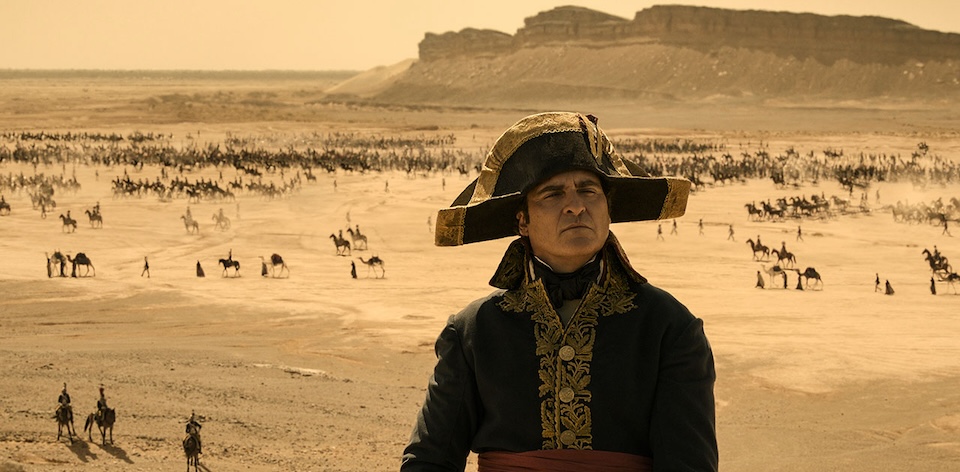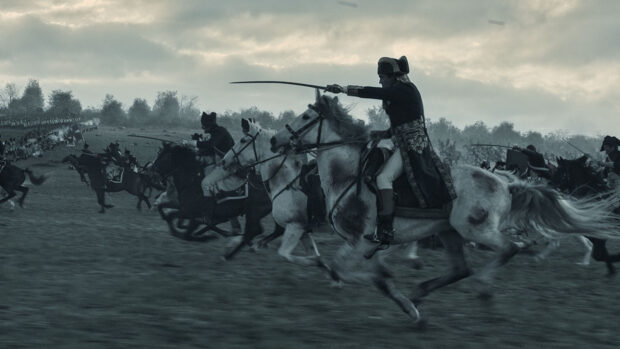One of the things we continue to admire about Ridley Scott is the diminishing number of fucks he has left to give. If you’ve ever read an interview with the filmmaker, there’s ample evidence he’s down to his last one. So, his unapologetic attitude and broad range of genre choices probably makes him the perfect choice to tackle Napoleon Bonaparte on screen.
In fact, Scott and writer David Scarpa (All the Money in the World) take a journey through several of those genres in NAPOLEON, a sprawling and often littered visual summary of the Frenchman’s Wikipedia entry. Kicking off during the 1789 Revolution, a brutal decapitation of Marie Antoinette sets the tone for everything that follows.
From the Reign of Terror to Napoleon’s (Joaquin Phoenix) rise and fall as Emperor, and his multiple exiles and battles along the way, Scott and Scarpa paint in broad brushstrokes. At the core is Napoleon’s tumultuous relationship with Joséphine de Beauharnais (Vanessa Kirby), shown as a microcosm of Napoleon’s obsessions. His empire building is often a backdrop to this dynamic. Which is why you might also get whiplash from the tonal changes in a film that leaps through Napoleon’s greatest hits as satirical farce (see also: House of Gucci), a romance, a political thriller and an action film.
It’s the latter that plays to Scott’s strengths, harnessing the grandeur of Gladiator or Kingdom of Heaven in the process. Each iconic battle is shot in such bloodletting detail that they demand to be seen on the biggest screen possible. They make tangible the scale of the hundreds of thousands Napoleon marched off to their deaths in his vain quest for power. Nevertheless, Scott is still somewhat preoccupied with human (and horse) viscera at every battle, even if he and regular photographer Dariusz Wolski somehow make blood under sheets of ice look gorgeous.
Scott is not concerned necessarily with accuracy or detail as much as he is in the mood. For example, there’s a lavish montage in which Napoleon marches back into France from his first exile only to learn of Joséphine’s fate (sorry, spoilers for history). Yet in reality he is said to have heard of her passing via a French journal while still in exile on Elba, and stayed locked in his room for two days, refusing to see anyone.
Phoenix might be perfectly cast as this figure, doing that stone-faced thing he does so well. At one point, Napoleon says of the British “You only think you’re so great because you have boats,” and it’s possible that only Phoenix could deliver a line – one of many that’s both deliberately and accidentally absurd – with such conviction.
Yet it is Kirby who gives us absolutely everything she has as Joséphine. While she is physically kept on the sidelines through the machinations of the empire, she is at the centre of everything that this version of Napoleon does. If there’s any justice in the world, she will win all the things and have a whole new edit dedicated to her character.
Like the historical figure it depicts, NAPOLEON is a wildly ambitious enterprise with some deep flaws. We know that Scott has a director’s cut in excess of four hours that does indeed explore more of Empress Joséphine’s story. I would welcome this expansion of Scott’s vision, as you are forever conscious of something missing in the connective tissue. Until then, you can sum up the contents of this theatrical cut with Napoleon’s dying words: “France…Army…Joséphine.”
2023 | USA, UK | DIRECTOR: Ridley Scott | WRITERS: David Scarpa | CAST: Joaquin Phoenix, Vanessa Kirby, Tahar Rahim | DISTRIBUTOR: Sony Pictures Releasing, Apple TV+ | RUNNING TIME: 157 minutes | RELEASE DATE: 22 November 2023







